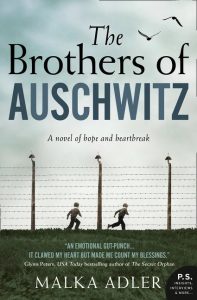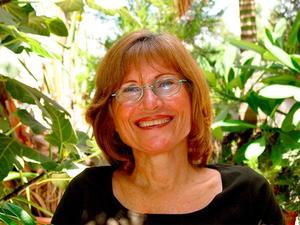Dov and Yitzhak are part of a family of four children that live in a small village in the mountains of Hungary. One day the Nazis arrive in their village and they are told they need to get on a train and leave their home. The conditions are horrific, and the family is split up. Who will survive?
I’ll admit, I had a hard time with this book. I love to read WWII historical fiction and I’ve read other books that take place at least partly in a concentration camp. This book is a good look at the extreme hardships that were endured in the concentration camp. It was very bleak and depressing. The randomness of who survived and who died was heartbreaking. Their initial fate upon arrival was decided by a white gloved Nazi officer who sorted everyone. Items like that really stood out such as the beautiful music played by the orchestra at the camp or the German child who would give Yitzhak sandwiches through the fence that helped him to survive. Another stand out item was having to hide on the top bunks so that the Germans wouldn’t see how skinny you were and decide you were unable to work. It was also heartbreaking when Yitzhak returned home after the war to find someone else living in his house. He really wanted to find his cat, but it had not been seen. The person that had taken over his house kept repeating how all of the Jews were gone and it was his house now. It’s strange to think that you could just rip entire families away from their life and then afterwards they had no where and no one to return to.
The novel is told like an interview with Dov and Yitzhak. They are telling their story in first person narrative in different chapters. The story read like broken English and was hard for me to get into. It made more sense to me in the author’s note at the end to discover that the author was originally from Bulgaria and that the this was a true story. Yitzhak lived with her family when she was a baby right after WWII and she grew up with him as part of her family. She interviewed both brothers and wrote this book as a result.
The story is told in three main parts. The brothers experience in Auschwitz, being liberated and their postwar experiences, and then their later life in Israel. Everything wasn’t bright and happy once they were liberated from Auschwitz. The brothers have to live with PTSD and survivor’s guilt for the rest of their lives. The end of the book has a great author note, interview, and reading group discussion.
Favorite Quote:
“My hunger was full of eyes like the angel of death.”
Overall, The Brothers Auschwitz is a deep look into what it was like for survivors to expe
rience a concentration camp and how that impacted the rest of their lives. Book Source: Review Copy from Harper Collins for being a
part of the TLC Book Tour. Thank-you! For more stops on this tour, check out this link.
About The Brothers of Auschwitz
• Paperback : 464 pages • Publisher : One More Chapter (September 1, 2020)
An extraordinary novel of hope and heartbreak, this is a story about a family separated by the Holocaust and their harrowing journey back to each other.
There was a good orchestra at Auschwitz. I could immediately hear it was good. I almost wept for the beauty of it, but the large pile of striped pajamas stayed in my mind, and I didn’t cry…
Dov and Yitzhak live in a small village in the mountains of Hungary, isolated both from the world and from the horrors of the war. But one day in 1944, everything changes.
The Nazis storm the homes of the Jewish villagers and inform them they have one hour. One hour before the train will take them to Auschwitz.
Six decades later, from the safety of their living rooms at home in Israel, the brothers finally break their silence to a friend who will never let their stories be forgotten.
Narrated in a poetic style reminiscent of Margaret Atwood, Malka Adler has penned a visceral yet essential read for those who have found strength, solace and above all, hope, in books like The Choice by Edith Eger and The Librarian of Auschwitz by Antonio Iturbe.



 About Malka Adler
About Malka Adler
Thank you for the review. The stories of WWI and II are always very emotional. This must be more than most as it involved a concentration camp.
ReplyDeleteTheir stories shouldn't be forgotten! Glad they've finally been told.
ReplyDeleteThis sounds like a very intense and interesting novel about Auschwitz survivors. The interview format sounds intriguing. Terrific review, Laura! As usual, I enjoyed reading your favorite quotation.
ReplyDeleteThank you for sharing your thoughts as part of the tour!
ReplyDeleteThank-you everyone! This was a sad, but important story!
ReplyDelete